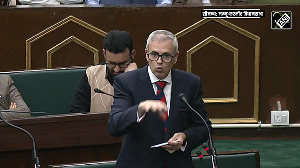
From elections in Punjab to those in Bengaluru, there's ground just waiting to be captured. But the party will need organisation, preparation, funding and ideological clarity, says Aditi Phadnis
The Aam Aadmi Party’s victory in the Delhi elections is the talk of the country. In Kotagiri in the Nilgiris district, AAP members garlanded a statue of former Tamil Nadu chief minister K Kamaraj (who is a Congress icon, by the way) and distributed sweets when the Delhi results were announced.
In Lucknow, AAP activists are planning a vijay juloos (victory procession) from Sapru Marg to the Gandhi statue at GPO square in Hazratganj. In Jammu, that was swept by the Bharatiya Janata Party just weeks ago in the assembly elections, AAP activists held processions, overjoyed at their party's victory.
In Thiruvananthapuram, jhadus (brooms) and white caps came out on the streets, as AAP activists celebrated the Delhi victory. State convener of the AAP, award-winning novelist and short story writer Sarah Joseph, who contested the Thrissur Lok Sabha seat, said the party's slogan is 'Now Delhi, Next Kerala', as it has a good support base here.
What after Delhi?
Winning changes everything. Suddenly, everyone wants to offer advice, they come carrying gifts -- and infections -- of all kinds. They all want to join you and help you and because you are taught to be polite, you don't know how to say no.
Friends say you're acting strange, they shake their heads and say you've changed (to paraphrase an old song). But you haven't changed, the circumstances have.
Extrapolate this on politics. Everyone wants a piece of the AAP after Delhi. We saw what happened the last time around. The AAP spread itself too thin, Kejriwal succumbed to the temptation of being a counterpoise to Modi, and for a brief while, came close to losing the political capital he had managed to put together.
And yet, that there is fertile ground for the AAP is undeniable. So how do you deal with victory?
The thing about the AAP is the perception that it is a tenacious body. The party doesn't give in; it hangs in there and fights.
Punjab is crying out for it, crushed as the people are between the Shiromani Akali Dal's 'pind' (village or extended family) politics and the Congress's narcissism. AAP needs an organisation and a slogan.
True, it didn't do well in the assembly by-elections to Patiala and Talwandi Sabo recently, barely three months after winning four Lok Sabha seats (in the by-election the candidates lost their deposit). But Punjab bucked the national trend by giving AAP four Lok Sabha seats. It can do it again.
The Rs 31,000-crore Brihanmumbai Metropolitan Corporation, which is gearing up for the elections in 2017, has been a plaything of the Shiv Sena-BJP combine for 20 years.
After the 2012 civic polls, the Shiv Sena has 75 corporators, and is dependent on the BJP (with 31 members) and 15 corporators from smaller parties and independents to enjoy a majority in the 227-member corporation council.
The story of Shiv Sena's rise to power in Maharashtra is well known. It began as a voice of the son of the soil when migrants from other states began to threaten employment and business, but morphed into an arbitrage body because the state had to be bypassed in providing many services.
The Shiv Sainik filled this breach, stood between the citizen and corruption, made things work and offered protection in a variety of ways.
Nothing is free, so petty criminalisation and extortion lubricated the vast and complex shakha machinery. With swelling collections, the BMC was a useful animal to control.
But now Balasaheb Thackeray -- who held the ‘remote control’ in his hands -- is no more, the Congress isn't much of a political threat and the danger of the Sena splitting is ever-present
On the ground, water, roads and power continue to represent an insurmountable problem for many living in Mumbai. If the AAP can do its research properly, this is a ground just waiting to be captured.
Bengaluru, with its rapid urban expansion, the lack of corresponding civic amenities and with little thought about innovative funding efforts to pay for this, is another possibility.
Interestingly, the destiny of the AAP and the BJP are linked. If the smart city plans of the BJP do take off, the AAP could have a natural constituency in these places. Urbanisation will see the decline of feudalism -- and because AAP circumvents feudalism (rather than contesting it) those who want to send it to a quick death will be the AAP's natural constituency.
The Bihar election might be too soon for the party to jump in. And the party will have to create conditions as close to Delhi as possible -- because as a wise man said, if you make a revolution halfway, you dig your own grave.
Forces of counter-revolution are so strong that they can neutralise you in the twinkling of an eye. In Delhi, the AAP lost many legislators to the BJP. The same can happen if it emerges just a bit player. So it would be well-advised to contest only if it is sure it can swamp out everyone else.
That needs organisation, preparation, funding and ideological clarity.
But it can be done.












 © 2025
© 2025